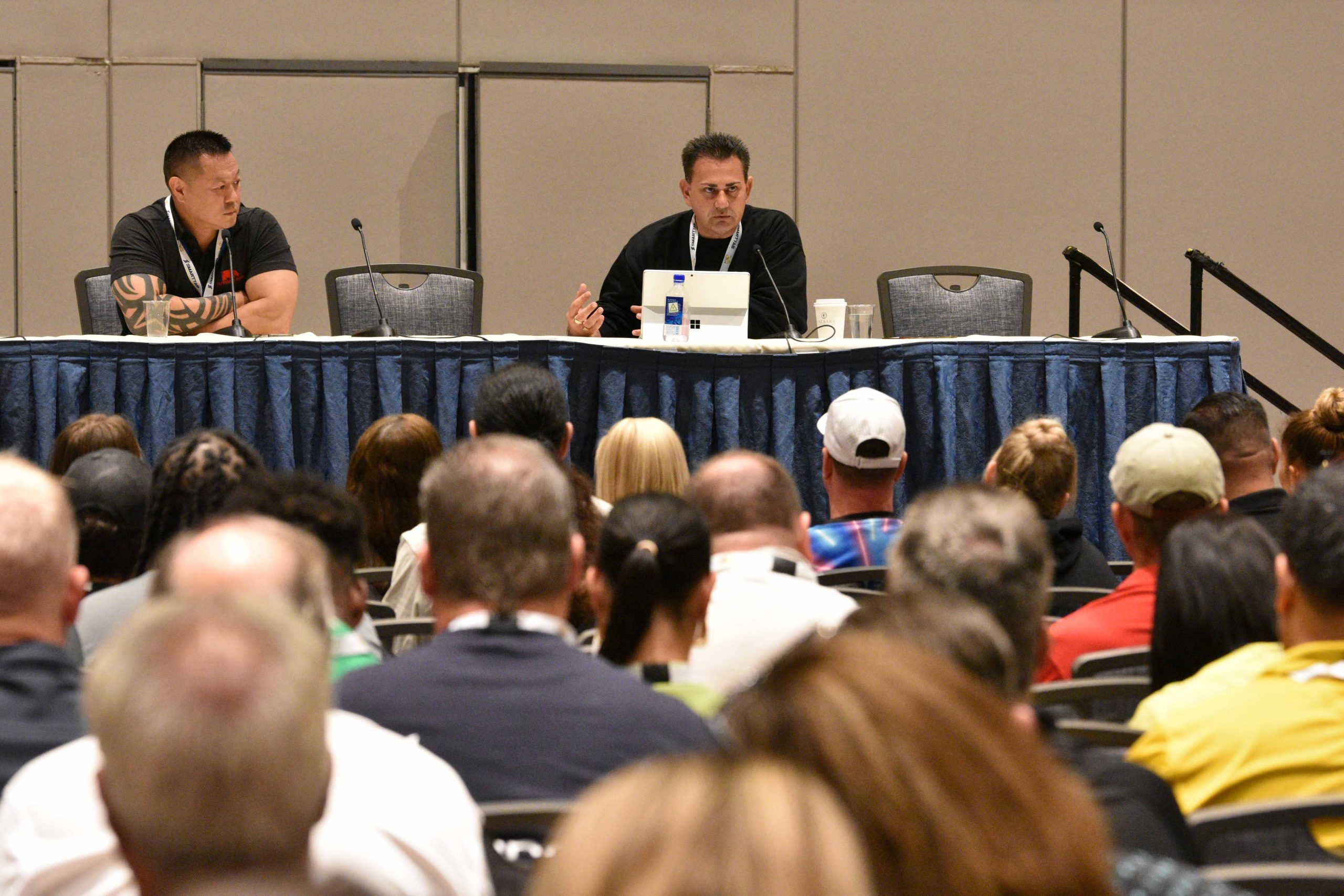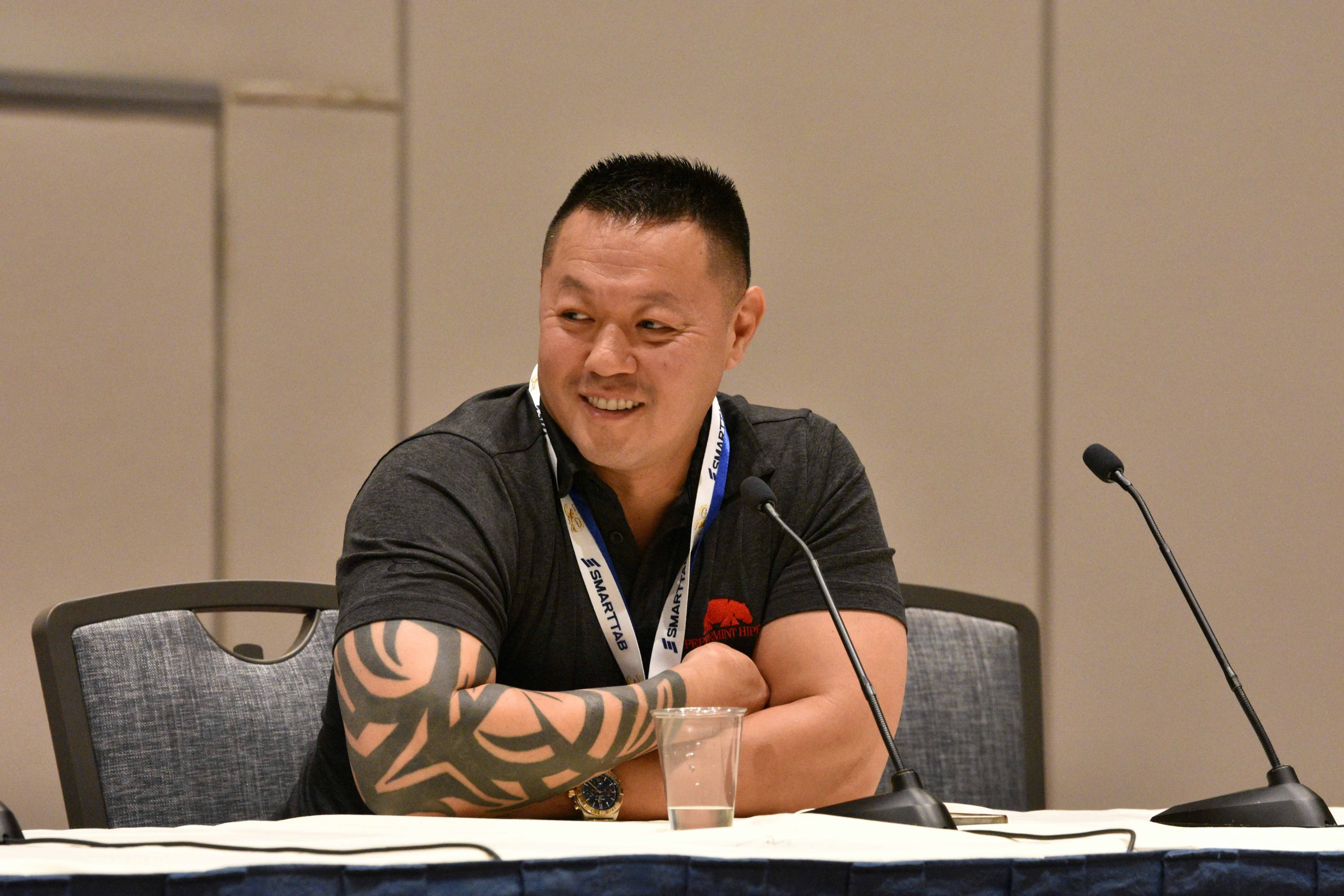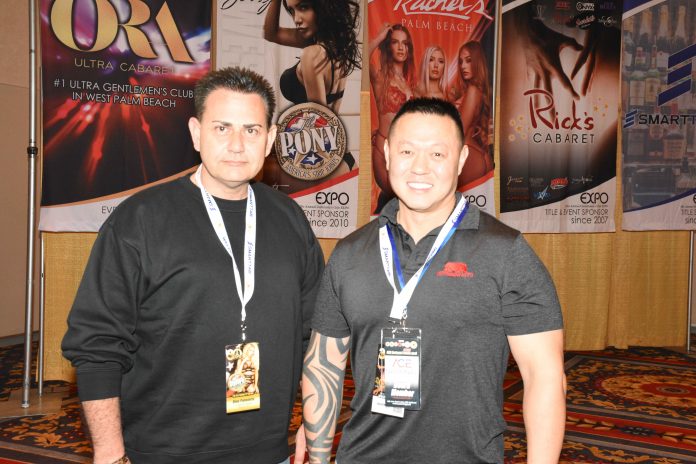Ultra-club or ultra-lounge might not be the only two models for the adult club industry’s future, but they speak to the new generation’s (as well as city officials’) distaste for the “dirty couch dance” and an overall need for change. At EXPO 2023, club owners Alan Chang (Peppermint Hippo) and Dino Palmiotto (Exposé) discussed their own visions for where the industry is, and where it’s headed.
(NOTE: This story appears in the November 2023 issue of ED Magazine.)
H
as the industry really changed that much since the first gentlemen’s clubs, or is the paint just peeling?
Chain club owner Alan Chang of Peppermint Hippo, and individual unit operator Dino Palmiotto of Exposé in San Diego, represent the next generation in adult club operation. At the EXPO 2023 “Renovation/Reinvention” seminar, transcribed below, ED’s Publisher, Dave Manack hosts a conversation with Chang and Palmiotto concerning their methods for renovations, as well as their reasonings for the regular updates.
Both Chang and Palmiotto, having begun their careers as doormen at some of the best-known clubs in the country, were familiar with the ins and outs of the traditional clubs before they began their ventures. The experienced operators therefore have plenty to say about how their realized visions could represent the future of the industry, already beginning today.
Manack: I want to start by finding out a bit more about each of you. Alan, when and where did you start your career in this industry?
Chang: I started my career in 2005, working Sapphire where I worked for about a year, then Spearmint Rhino, Las Vegas, where I worked for close to 10 years. I left in 2015, and I opened my first club in 2018 in Toledo, Ohio. I now have 10 clubs, with eight fully running, and two that are going through total remodels
Manack: Dino, conversely, what’s your background? When did you first start in this industry, and how did you grow to a point where you became an owner?
Palmiotto: In 1997, I worked as a doorman at the Kearney Villa Deja Vu. I was in the Marine Corps, and I was working at night, so I could go to school full time. I had no inclination of joining this industry whatsoever, just fell into it, enjoyed it and saw some things I could do there. I ended up getting out of the Marine Corps in 1999, and that happened to be the day that I bought into the original Expose. And then, in January 1, 2002, I bought all the investors out, and I’ve built up Expose from there.
Manack: Dino, for anybody in the audience here right now that feels as if renovating their club is too big of a project to take on, can you talk about the process of your renovations? Do clubs have to close operations completely in order to renovate?
Palmiotto: In terms of renovation, it’s something that I do every single day. I don’t really stop. We’ve put flooring down while we’re open, and the customers just love it. They want to see their money going back into the club.
Manack: I think that one of the areas of a club that can often be overlooked is the restroom, but it’s the one room that almost everybody in your club’s going to visit at one point or another.
Chang: The previous owner had no doors on the stalls. The bathroom had a curtain up, so if anyone wanted to use the bathroom, he charged them $10 to pull the curtain shut.
I knew that to transform the club, we couldn’t do it running a trough bathroom with curtains for doors.
Manack: And can you explain what else you did, and why?
Chang: We elevated all the booths. In Little Rock, you can’t sell bottled liquor, only champagne. This is the South, and everyone was trying to tell us that “No one buys champagne down here.” So we changed that, and it’s all because of those booths, just that one step up makes the customers feel more important. Now we sell a lot of champagne out there. We’re selling Ace of Spades where no one thought we could.
Manack: When you walk into a club for the first time and you’re going to purchase a club, how do you set your strategy for the renovation itself?
Chang: Well, most of the clubs are not fully running at a high level when I acquire them, they’re like Little Rock was, and they require full renovations.
For the Little Rock bathroom renovation, I made the women’s a unisex bathroom, so we could work on the men’s first. I didn’t have the funds back then to do the whole thing right away, so I did it in financial stages as was feasible, beginning with the bathrooms. I put up a display in the club which featured the renovation design, so our customers could know what was coming, and they all loved that.

“The city of San Diego is not an easy city to deal with. If you have a club that looks like it needs work, they’re going to come bother you. Put the work in, clean it up and the city will drive by, especially when you’re on the side of a freeway like I am, and say, ‘Wow, that building doesn’t look so bad anymore.’ It goes far with the city council and police commissioner, which, for a business on the fringes, actually helps you in the end.”
– Palmiotto
Manack: Dino, What did you target first when you bought Expose and you realized there was a lot of work you wanted to do?
Palmiotto: We immediately targeted the entranceway, and obviously, the shingles. They weren’t compliant with the fire department, which had already come by and said something. We also got rid of the windows for liability sake. And then we gutted the actual entranceway. Once we did that, we had a nice focal point for people to come into and decide whether they were going to the VIP or onto the main floor.
Manack: Curb appeal is the first impression that anybody has of a club is when they pull up.
Palmiotto: The city of San Diego is not an easy city to deal with. If you have a club that looks like it needs work, they’re going to come bother you.
To make the community a nicer place, it just takes a little bit of paint. I mean, nothing in those pictures is expensive, but it’s work. Put the work in, clean it up and the city will drive by, especially when you’re on the side of a freeway like I am, and say, “Wow, that building doesn’t look so bad anymore.” They do appreciate it. It goes far with the city council and police commissioner, which, for a business on the fringes, actually helps you in the end.
Manack: And Dino, can you talk to me a bit about your renovated stage?
Palmiotto: Yeah, it’s really the first digital stage in the industry. It literally is a computer screen. And the prettier the stage is, the prettier the girl is, right? So put some money into your stage and support your girls.
We also moved the stage, so that when you walk into the club, it’s the first thing you see, because that’s what everybody’s there for is the iconic girl on stage.
This industry is about a show, not a dirty couch dance. I bring in features every week, more than anybody in the country. We probably hold the biggest event in the entire west coast, United States, and the features who come in help to teach our girls to bring the show back. It all kind of leads into the next thing, but you’ve got to spend the money.
Manack: So for club owners who are questioning whether they should invest in a renovation of some kind, why do you think they should consider it? What does a renovation, small or big, do for the club, even if they feel like they’re already doing pretty well already?
Chang: I own clubs in small areas, and what happens is, if you don’t do it, someone’s going to come in and do it first, and then all of a sudden, your club looks 30-years-old. It’s very hard to compete against a club that’s brand-new. You might have the customers and the girl count right now, but over time, you’re going to get overtaken if they have good operations.
Manack: And Dino, as a single unit operator, how is the renovation of a club important for its reputation?
Palmiotto: At least in San Diego, I’ve got the city inspectors and officials of all kind coming in with the preconceived expectation that we’re a seedy industry when we’re not. We’ve got a fiduciary duty to tell this world that we’re just a normal business. Having a nice club and spending some money on it helps to reflect that. It’s not all for me to not put money in my club, I owe it to my entertainers, my staff, my operators and my city. Spend some money and look at the big picture. We’re sponsored by LavAzza coffee, bindi desserts and Fumari and Mazaya hookah. Those big names bring legitimacy to our industry.
Manack: Each of you is successful with different approaches to your clubs. Alan, how would you describe the personality of Peppermint Hippo? What do you want the brand to be known for, and how are you building that right now with your renovations and the way you’re opening the clubs in various markets?
Chang: I focus on the nightclub side, by bringing high energy in the lighting, sound and music. I also cater my club to an audience that includes women, couples and people that are there just to have fun, not just the guys that want to go back in the VIP room, even though that’s where the money is. In the long run, in my eyes anyway, we get more of the overall base. Instead of just single guys coming in, we get the party guys and the party girls to come in and just create an experience for everyone that is fun.
Manack: And Dino, you have a very different brand philosophy. Can you talk a bit about how the identity of Expose was designed?
Palmiotto: Expose was designed to be the first strip club lounge in America, catered to businessmen as a place they could go to to relax. We have a lounge outside where customers can smoke cigars, of which we carry over $100,000 worth. They can order food, espresso and desserts. I don’t want 50 to 100 kids; give me 25 to 30 businessmen that can afford to take care of my girls, and I’ll be a happy guy.
Manack: Over the last few years, much of the industry is concerned with where it’s headed. You both represent a different vision of that future. Alan, how do you imagine our industry in ten years, at the 40th anniversary of the ED Expo?
Chang: I think people are either going to have to adapt, or they’re going to go down under, especially the smaller clubs. There are at least two routes: the nightclub route and the high-end route, and I don’t think one way is better than the other way. Both can work, and they both do work. But if your club is rundown, sooner or later, you’ll get closed down, either by the government or just by competition.

“When I first I opened up my clubs in Toledo, Ohio; Neenah, Wisconsin; and Little Rock, Arkansas, they all knew I came from a big market, and the first thing they always said to me was, ‘That’s not going to work here.’ I replied, ‘People don’t like customer service here?’ It’s more useful to think, ‘How can I make this better and make it a gentleman’s club and not just a dive bar?’ If you want to keep growing, you’re going to have to change.”
– Chang
Manack: And how about you, Dino? The nightclub environment does work for some clubs in some markets, but you chose the ultra-lounge approach. Do you think that in 10 years, we’ll be seeing more of those?
Palmiotto: I’ve been fortunate to work with some really great people, and I see a significant gap in our industry. It’s very top-heavy with a lot of gentlemen that have put time and effort in, the legends, and then very few people that are willing to take the reins. We need more owners that are going to give a shit. Harry said it best: If you’re doing entertainment, you’re going to be around. I know I’ll be here in 10 years, and I hope that all you are here with us.
Manack: What is one mistake you see a lot of owners making and how would you tell them to rectify that?
Chang: When I first I opened up my clubs in Toledo, Ohio; Neenah, Wisconsin; and Little Rock, Arkansas, they all knew I came from a big market, and the first thing they always said to me was, “That’s not going to work here.”
I replied, “People don’t like customer service here?” Because if you think like that, then it’s not going to work here. It’s more useful to think, ‘How can I make this better and make it a gentleman’s club and not just a dive bar?’ If you want to keep growing, you’re going to have to change.
Palmiotto: Don’t be an absentee owner. Go to your clubs, say hello to your people. I talk to them, I know their family situations, I know everything. I do everything I can to stay in touch with my staff. Every single one of my girls has my cell phone number. If there’s a problem, I get a phone call. And if you’re not going to do that, then please don’t get into the business, because what’s going to end up happening is, unfortunately, these people that don’t have a leader are going to do stupid shit, and then the police gets involved, and we all have problems. Don’t think that it doesn’t affect all of us.






























